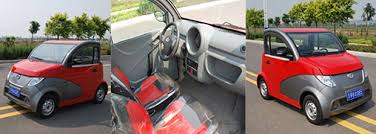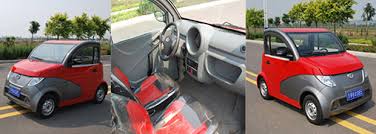
Comprising mainly locally-branded models that are cheaper and have a shorter range than those offered by foreign automakers such as Tesla and Nissan, the electric cars that are old are sold in China is more than in the rest of the world combined.
As part of Beijing's policy to build global leadership in cleaner energy driving, the Chinese-branded electric vehicle (EV) market is propped up by huge government subsidies.
Companies like including Warren Buffett-backed BYD and BAIC Motor are gaining traction among urban drivers as well as taxi fleets and government agencies and China has spent billions of dollars on subsidies to help such companies to achieve large-scale production of plug-in vehicles.
In January-November, touching 402,000 vehicles, the sales of battery electric and plug-in hybrids increased 60 percent. China wants 5 million plug-in cars on its roads by 2020.
The domestic EVs simply sell on price and don't have the 'wow' factor of a fast, longer-range and luxury-style Tesla.
While a two-door battery electric Chery eQ would cost around 160,000 yuan without subsidy in Shaghai last year, the same Chery eQ cost around 60,000 yuan ($8,655) after subsidies. After a $7,500 federal tax credit, General Motors showed off its latest Bolt EV, which costs around $30,000 at this week's Detroit auto show.
"EV cars are very cheap (in China), you'll only spend a little money to buy a car. If you just go to work or use an EV in the city, it's OK ... for using within 100 kms (62 miles)," said Xie Chao, who works for a chemical company in Shanghai.
Dawei Zhang, CEO of EVBuy, a dealer said that price is the deciding factor because most Chinese electric cars come with similar specifications. He said that with decent enough quality at a low price, the eQ has been the top seller in recent months.
"It's a transport tool. It's purely for mobility rather than for showing off, having a big car for all the family, or for any technology factors," he added.
They primarily bought plug-in vehicles to easily get a license plate, some EV buyers in Beijing and Shanghai said. While freely awardig plates that can only be used by plug-in vehicles, license plates for traditional gasoline cars are tightly controlled in half a dozen of China's biggest cities.
Price is the key therefore for those set on buying a plug-in.
By producing cars under new made-for-China brand names such as Denza, foreign manufacturers can access subsidies only via joint ventures with local partners and hence China's cocktail of pro-electric policies is a challenge for global automakers.
But those brands cost more than most local brands even after subsidies and lack the cachet of established foreign marques.
Nissan's global chief Carlos Ghosn told Reuters in November that the sale ofis not very well for the version of the Leaf that Nissan's joint venture with Dongfeng Automobile offers in China, under the Venucia brand. Ghosn said that the Nissan vehicle is too expensive because Chinese EV buyers don't want to spend much more than $8,000.
(Source:www.reuters.com)
As part of Beijing's policy to build global leadership in cleaner energy driving, the Chinese-branded electric vehicle (EV) market is propped up by huge government subsidies.
Companies like including Warren Buffett-backed BYD and BAIC Motor are gaining traction among urban drivers as well as taxi fleets and government agencies and China has spent billions of dollars on subsidies to help such companies to achieve large-scale production of plug-in vehicles.
In January-November, touching 402,000 vehicles, the sales of battery electric and plug-in hybrids increased 60 percent. China wants 5 million plug-in cars on its roads by 2020.
The domestic EVs simply sell on price and don't have the 'wow' factor of a fast, longer-range and luxury-style Tesla.
While a two-door battery electric Chery eQ would cost around 160,000 yuan without subsidy in Shaghai last year, the same Chery eQ cost around 60,000 yuan ($8,655) after subsidies. After a $7,500 federal tax credit, General Motors showed off its latest Bolt EV, which costs around $30,000 at this week's Detroit auto show.
"EV cars are very cheap (in China), you'll only spend a little money to buy a car. If you just go to work or use an EV in the city, it's OK ... for using within 100 kms (62 miles)," said Xie Chao, who works for a chemical company in Shanghai.
Dawei Zhang, CEO of EVBuy, a dealer said that price is the deciding factor because most Chinese electric cars come with similar specifications. He said that with decent enough quality at a low price, the eQ has been the top seller in recent months.
"It's a transport tool. It's purely for mobility rather than for showing off, having a big car for all the family, or for any technology factors," he added.
They primarily bought plug-in vehicles to easily get a license plate, some EV buyers in Beijing and Shanghai said. While freely awardig plates that can only be used by plug-in vehicles, license plates for traditional gasoline cars are tightly controlled in half a dozen of China's biggest cities.
Price is the key therefore for those set on buying a plug-in.
By producing cars under new made-for-China brand names such as Denza, foreign manufacturers can access subsidies only via joint ventures with local partners and hence China's cocktail of pro-electric policies is a challenge for global automakers.
But those brands cost more than most local brands even after subsidies and lack the cachet of established foreign marques.
Nissan's global chief Carlos Ghosn told Reuters in November that the sale ofis not very well for the version of the Leaf that Nissan's joint venture with Dongfeng Automobile offers in China, under the Venucia brand. Ghosn said that the Nissan vehicle is too expensive because Chinese EV buyers don't want to spend much more than $8,000.
(Source:www.reuters.com)





